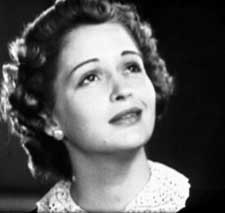 Mary Healy had been a beauty pageant winner in New Orleans, a young woman of considerable beauty, & became a regular singer at the Roosevelt Hotel in New Orleans backed by a series of dance bands.
Mary Healy had been a beauty pageant winner in New Orleans, a young woman of considerable beauty, & became a regular singer at the Roosevelt Hotel in New Orleans backed by a series of dance bands.
She was discovered by 20th Century Fox who began grooming her for the films in 1939, beginning by sending her on a Vaudeville tour so America could get to know her in person.
She perhaps derailed her chances at a bigger film career when she fell in love with & married commedian Peter Lynd Hayes. She devoted herself to his cabaret troupe thereafter. They appear together in the bizarre fantasy film The 5000 Fingers of Dr.T (1953), & they had a shortlived television sitcom Peter Loves Mary (1960).
She made a handful of "actorly" soundies in 1941, before she met Peter. In these we get to see the kind of performer she might've remained had she not become part of a husband/wife comedy team instead.
One such is Dreaming Out Loud (1941) which, though only a three-minute soundie, manages to capture much of the feeling of a romantic comedy film.
A secretary (Mary Healy) brings some notes into the office of her boss (Walter Byron) as music by the David Rose Orchestra rises in the background. The boss, smoking a pipe & barely noticing the presence of his secretary, leaves the room while the secretary gazes at him dotingly.
She grabs his coat & hat & arranges these in his chair so she can pretend he's still present, & begins singing the title number "Dreaming Out Loud," with a sweet pure voice:
"I see a chapel, the organ plays/ I'm so excited, so proud/ I beg your pardon/ I was just dreaming out loud/
"I walk beside you right down the aisle/ We fight our way through the crowd/ I beg your pardon, I was just dreaming out loud..."
It's a nice swing number, but the staging gets a mite laughable. As she attends to the imaginary needs of her boss's jacket & hat, she gets one of his pipes from the side of a humidore, sticks it in a button hole of his coat, & lights a match for the coat (discarding the match inappropriately).
About then, her boss opens the door, & stands secretly watching her singing, fantasizing, & lucky not to set his coat on fire.
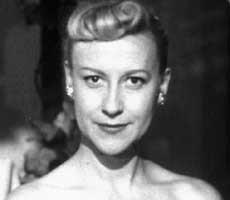 George Ford is backed by the David Rose Orchestra, or part of it, including a terrible accordian, in a restaurant setting for I Don't Stand the Ghost of a Chance (1941). George Ford is backed by the David Rose Orchestra, or part of it, including a terrible accordian, in a restaurant setting for I Don't Stand the Ghost of a Chance (1941).
George next to the accordionist sings lyrics a mite shy of inspired: "I need you oh so badly/ I love you oh so madly/ But I don't stand a ghost of a chance with you/ I thought at last I found you/ But other loves surround you/ And I don't stand a ghost of a chance with you."
This song was close to being a standard for a while, covered by such guys as Bing Crosby & Frank Sinatra. But it's kind of a lame number even so, & kind of deserved being made light of.
So as George sings, out strolls commedienne Mary Healy. George joins her, wooing her with his song. As he looks away at the musicians, she mouths to the camera about George: "B-O!" which is pretty much a relief because the performance is so rotten someone had to make fun of it.
She then make a "he's a square" sign with her hands, & mimes a great many more insults. She's so cute & funny! The "he's wearing a toupee" & "he's got a glass eye" mimes are especially fun.
The adorable comedy routine being added to a bad bit of singing saved this soundie's life, making it a good one. It was included in the home-movies release from Official Films, Moonlight Melodies (1947), together with Buddy Clark's Moonlight Cocktail (1942) & Les Elgart & His Orchestra's Dream, Dream, Dream (1946).
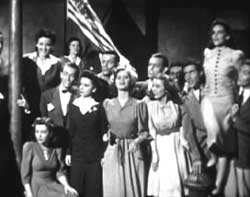 As the panoram fad struck headlong into the war years, many a soundie strives for sentimental patriotism. As the panoram fad struck headlong into the war years, many a soundie strives for sentimental patriotism.
The singing group The Nationairs was just an alternate name for The Men & Maids of Melody when they recorded war-is-good soundies.
They perform There's Something About a Soldier (1941), composed by Londoner Noel Gay's tune. It had become something of a standard during the war years, introduced by Cicely Courtneidge in the awful musical comedy Soldiers of the King (1933), the song having had longer legs than the movie.
The instrumentation on this soundie is provided by Ray Bloch & His Orchestra, an omnipresent band on 1940s radio & 1950s television, & a studio orchestra for a great many early soundies. Pretty much across the board if Ray Bloch was trucked out to do the music, it won't be thrilling stuff.
The Nationairs are standing by a waving flag looking hard in an over-acting manner at an imaginary passing parade of soldiers. They give a group-sing of the title number in that bland style that would be kept alive past its time on the Lawrence Welk Show.
Halfway through while the group is practically chanting "There's something about a soldier, something about a soldier," the film cuts to an actual military parade, with the Washington D.C. capitol building visible in one shot.
When it cuts back to the Nationairs, they've all gone into a wooded area & the guys are now in uniform paired up with the girls for necking in the park. Helen Walker sings the song as a solo, & there's nothing wrong with her performance: "Oh a military chest seems to suit the ladies best/ There is something about a soldier that is fine fine fine."
To tell the truth, it is a snappy little diddy, & I found myself later singing it to my dog Daigoro: "There's something Daigoro, something about Daigoro. There's something about Daigoro that is fine fine fine."
It ends with Helen meeting a general in the woods & going arm in arm with him back through the park, causing all the soldiers to stand & salute so that their girlfriends one by one fall the laps onto the ground. Slightly funny, but frankly, Betty Boop (or Mae Questal) sang it better in the cartoon There's Something About a Soldier (1934).
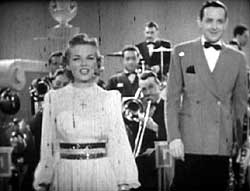 Jimmy Dorsey & His Orchestra perform Man That's Groovy (1943) with Jimmy starting the number off with a lead instrumental on his licorice stick.
Jimmy Dorsey & His Orchestra perform Man That's Groovy (1943) with Jimmy starting the number off with a lead instrumental on his licorice stick.
Then the whole orchestra stands up & sing: "Way up town/ There is a rift that's goin' round/ And all the cats have got it down/ Cuz it's solid, & in the groove."
At that point fresh-faced singer Helen O'Connell displaying a Christian cross prominantly on her bosom (perhaps to protect herself while singing the devil's music) takes up the number:
"In the lingo of hi-di-ho/ When the Harlem rhythms flow/ Here's the way to say 'Yes, I know'/ Man, that's groovy."
Helen takes being white to absurd heights of milsquetoast & couldn't be a worse choice for singing jive lyrics. She comes off like Dale Evans at the Cotton Club, a whole lot funnier than intended.
If you'd never heard the Four Blazes singing the original, it would be impossible to tell if this could've been a reasonably good jump-jazz number. It seems like it's just awful with Helen butchering it. But blame Jimmy Dorsey for making her sing it, as she was pretty good given the right material.
Helen also appears in the one-reel musical short Jimmy Dorsey & His Orchestra (1940). She can be heard to best advantange on a number of Dorsey records from 1939 to about 1943, when she temporarily retired from show business to begin a family, returning in 1951 with a somewhat successful solo career.
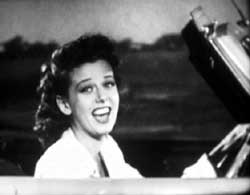 As Eleanor French sings the introductory lines of I'm Just Wild About Harry (1941) she's seated on a stage arrayed to look like a rooftop cafe, with a young man sad to have his engagement ring returned to him. The unseen & insignificant back-up band is the Claude Garreau Trio.
As Eleanor French sings the introductory lines of I'm Just Wild About Harry (1941) she's seated on a stage arrayed to look like a rooftop cafe, with a young man sad to have his engagement ring returned to him. The unseen & insignificant back-up band is the Claude Garreau Trio.
With a jump-cuts to Eleanor driving happily down the highway (or with rear-projection screen making it look somewhat like driving down the street), she's singing the old ragtime favorite as though she didn't just savage some poor man's heart.
She pulls into a gas station (very minimally staged as one) where an incompetent station attendant, apparently Harry, is so discombobulated seeing Eleanor that he accidentally gives her a flat tire, puts water in her tank, & ultimately blows up the whole car. So he drives her home in his own car which he has taken better care of.
There is alas absolutely nothing special about Eleanor's interpretation. The song is gutted of its original ragtime flavor to fit it to an entirely different decade, but as a swing number she reduces it to blandness. The comedy of the soundie misfires though lending it more interest than the singing per se.
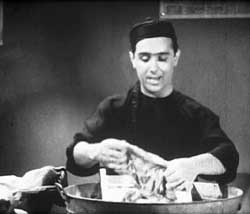 Maxine Conrad was never a big success, but she had charm. She had small largely uncredited acting roles in a handful of films, like the theater usher in Andy Hardy Gets Spring Fever (1939).
Maxine Conrad was never a big success, but she had charm. She had small largely uncredited acting roles in a handful of films, like the theater usher in Andy Hardy Gets Spring Fever (1939).
So her biggest "starring" roles ended up being her two soundies, including Ching Chong (1943), backed by the unseen ivan Scott Orchestra, which can be seen in all its goofy glory in another soundie, The Rotary Swing (1943).
Maxine co-stars in Ching Chong with Maurice "Muzzy" Marcellino, who played guitar & sang with the Phil Harris Orchestra. He was also well-famed for his whistling, & during the 1950s, just about any really great whistling you heard in a movie or commercial was him. It's him rather than John Wayne whistling in The High & the Mighty (1954).
Maxine's cute as a button, & has decent back-up by the unseen Orchestra. The novelty number is bouncy & cute if you can overlook the racism of it, about a Chinese laundryman who we see acted out by Muzzy, who sings in retarded accent: "Ching Chong he sing song veddy veddy well/ Don't ya think? Me think Ching Chong sing veddy veddy swell."
When it cuts back to Maxine who sings the same lyrics afresh, she does it better; she gives it a jump-jazz feeling that works, even though nobody could really save such lyrics as "Ching Chong play ping-pong veddy veddy well/ Doncha think? Me think Ching Chong play ping-pong veddy veddy swell."
At the instrumental break, some chorus girls who were stooped down behind Maxine leap up & do a fairly ridiculous group dance. It then jump-cuts to Maxine & Muzzy together for some "comedy" dialogue the high point of which is Muzzy squeeking, "Solly lady, no ticky no washy."
Production-wise this soundie has several "wipes" instead of jump-cuts, & wipes & other fancy edits weren't common in soundies. So the editing is more sophisticated than the song.
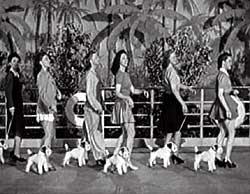 The novelty hit that survived beyond its decade as a children's song Where Has My Little Dog Gone? (1951) is mounted by Claude Thornhill as a swing-jazz big-band arrangement.
The novelty hit that survived beyond its decade as a children's song Where Has My Little Dog Gone? (1951) is mounted by Claude Thornhill as a swing-jazz big-band arrangement.
Not for an instant is it forgotten that the song's ridiculous, at one point showing a chorus line of gorgeous gals out walking stuffed toy dogs, with even a jest about the toy dogs pooping.
Then we get a skit involving a young woman's dog stolen by a young man (Buddy Stewart) who runs a hot dog stand.
The young woman, Martha Wayne, sits down at the hot dog stand & sings to Buddy, "Oh where oh were has my little dog gone?" & he continues the number "Oh where oh where can he be?" as if he doesn't know what's in the hotdog he's preparing a hot dog for Martha.
The duet continues, & neither of them are very good singers. Martha in particular is affecting a tiny-little-girl attitude that isn't well enough done to be funny & completely spoils the musicality of her voice, if she ever had any.
When she's about to eat her hot dog, it jumps out of its bun, the strings clearly visible, sprouts wings, & flies away. Certainly an odd thing to happen in a telescription. Martha, realizing the bastard turned her pet into hotdogs, is joined by the chorus girls in pulling the guy out of the stand & beating him up.
We're then back in the studio watching the band finish up the number as if all of it mattered. Bad music with bad comedy, which kind of fits.
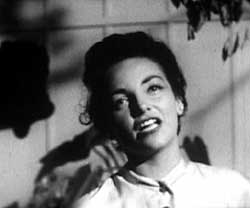 June Valli removes her glasses on a front-stoop at night, & begins singing the romantic lyrics by Ted Mossman & Buddy Kaye: "Full moon & empty arms/ The moon is there for us to share but where are you/ A night like this could weave a memory/ And every kiss could start a dream or two..."
June Valli removes her glasses on a front-stoop at night, & begins singing the romantic lyrics by Ted Mossman & Buddy Kaye: "Full moon & empty arms/ The moon is there for us to share but where are you/ A night like this could weave a memory/ And every kiss could start a dream or two..."
A pleasant enough but minor singer, June's rendition of Full Moon & Empty Arms (1951) comes off like a musical interlude in particularly dull feature boy-gets-girl movie, or a tropical-nights piece of commercial exotica, Mossman & Kaye having based the melody on Rachmaninoff's "Piano Concerto Number 2."
June is an undeniable beauty & carries herself with a lot of class though her father, a laborer, had been a street singer in Naples, & she grew up in a household that spoke very little English.
When discovered by Harry Salter, she was an overweight office worker with a heavy Bronx accent. He took her under his wing, got her to lose weight, sent her for lessons in elocution, encouraged her to change her name to Valli, & by 1952 had her a solid RCA recording contract & television appearances.
Her main claim to success was numerous appearances on television variety hours during the 1950s & 1960s. She was a regular on Your Hit Parade in the early '50s. A more amusing claim to less noticed fame was becoming the singing voice of Chiquita Banana.
Her television work won her the sobriquet "musical sweetheart to millions," but it'd be decidedly fewer than millions if based on record sales. Had she been a singer of the '40s out in front of big bands she might've sold better, but the 50s belonged to rock.
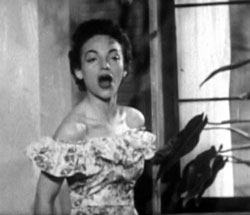 June Valli appears suddenly at the top of a small staircase & immediately belts out a diva song in Strange Sensations (1951), in this Snader telescription.
June Valli appears suddenly at the top of a small staircase & immediately belts out a diva song in Strange Sensations (1951), in this Snader telescription.
It's either an awful song or her interpretation stinks, as it holds the attention in the manner of train wreck rather than a meritorious performance. The song runs in part:
"Strange sensations/ Our love is such a strange sensation/ You've chained me with a fascination/ I've never known before/ You thrill me more & more." I bet that one took an hour to compose.
She has by the end of the first verse reached the bottom of the steps & is soon sitting on a picnic table continuing the faux-Latin tropical-romance number.
Vali really shouts it out & is pretty to look at in her tacky tight fitting gown. When she screams "So hold me TIIIIIGHT..." it sounds like she's strangling a cat. She bows lightly with misplaced dignity when she's finished with the cat.
This telescription must've gotten considerable airplay in the first days of that new fad, television, for a year after recording the telescription, it became her first solo hit in the wake of her stint with the Stan Kenton Orchestra.
Her few Snader shorts seem to have insured her a certain status in early television, as she appeared thereafter on variety show after variety show, then in 1957 co-hosted the variety series The Andy Williams & June Valli Show.
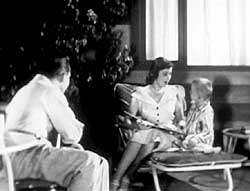 Wayfaring Stranger (1952) is a Snader Telescription, set beside a backyard pool with an obviously well-off nuclear family -- husband, son, wife.
Wayfaring Stranger (1952) is a Snader Telescription, set beside a backyard pool with an obviously well-off nuclear family -- husband, son, wife.
The wife seated on her sun lounge begins singing the spiritual as her kid climbs onto the lounge beside her: "I am a poor wayfarin' stranger/ A-wanderin' through this world of woe/ And there's no sickness toil or danger/ In that bright world to which I go..."
The family is so white-bread & sourrounded by images of wealth that it's a wildly inappropriate tune to be singing, as it's hard to believe this gal knows "this world of woe" from dinner at the Waldorf.
Vocalist Nancy Donovan does a so-so version but not a lot of character in it, which just increases the sense of her being the wrong person to sing it.
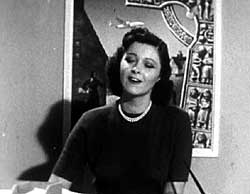 Included in the dvd compilation of soundies & telescriptions The Swing Years: Dance Your Old Age Away (2004) as by "unknown artist," it's followed immediately by another Nancy Donovan telescription, Galway Bay (1951) credited to "Irish" whatever that means. Included in the dvd compilation of soundies & telescriptions The Swing Years: Dance Your Old Age Away (2004) as by "unknown artist," it's followed immediately by another Nancy Donovan telescription, Galway Bay (1951) credited to "Irish" whatever that means.
This "The Swing Years" series of soundies compilations was done in the most awfully haphazard unknowledgeable manner imaginable. But I guess it's good they're available at all, despite the complete failure to research or restore any of these films properly.
Donovan sings in the telescript film Galway Bay while seated at a desk in an office -- seemingly a travel agency -- with an Irish travel poster pinned crookedly on the wall behind her. About as lazy a set as any Snader Telescription ever sunk to.
The lyrics are about as crummy as they come, about maybe going to Ireland & being nostalgic about that possibility. It's sung slowly & is completely corny, but you can tell by Nancy's trilled Rs & couple moments of fake Irish dialect that she is completely serious.
copyright © by Paghat the Ratgirl
|
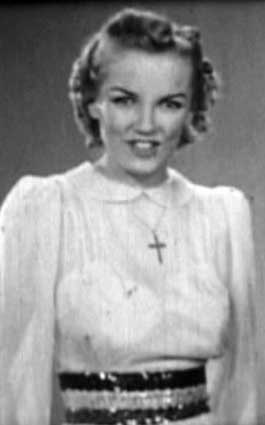










 Included in the dvd compilation of soundies & telescriptions The Swing Years: Dance Your Old Age Away (2004) as by "unknown artist," it's followed immediately by another Nancy Donovan telescription, Galway Bay (1951) credited to "Irish" whatever that means.
Included in the dvd compilation of soundies & telescriptions The Swing Years: Dance Your Old Age Away (2004) as by "unknown artist," it's followed immediately by another Nancy Donovan telescription, Galway Bay (1951) credited to "Irish" whatever that means.